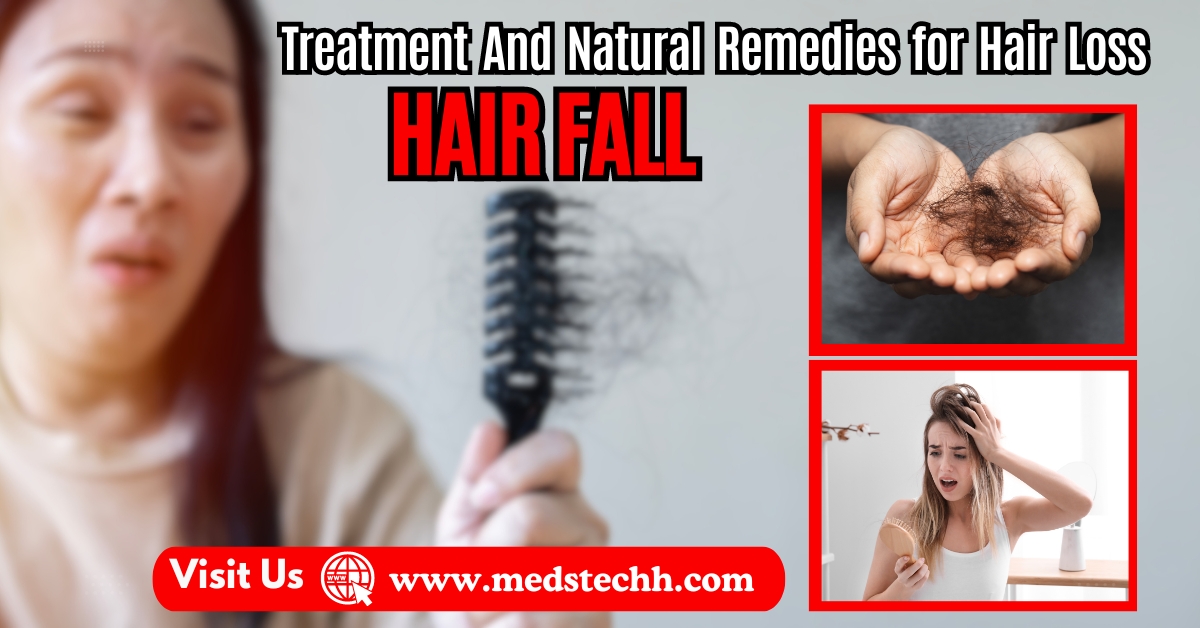Hair loss is a common concern for numerous people, impacting both males and females across all age groups. Whether it’s a few extra strands in the shower drain or noticeable thinning, experiencing hair fall can be distressing. Understanding the underlying causes and available treatment options is crucial for effectively managing this condition.
Understanding Hair Fall
Hair loss, also known as alopecia, refers to the excessive shedding of hair from the scalp. While it’s normal to lose some hair daily, excessive hair fall can lead to noticeable thinning and even baldness. The prevalence of hair fall varies among individuals, with factors such as genetics, lifestyle, and environmental influences playing significant roles.
Hair Fall in Women:
- Postpartum Hair Fall:
- Many women experience temporary hair fall after childbirth due to hormonal changes. This postpartum shedding typically resolves on its own within a few months as hormone levels normalize.
- Menopausal Hair Fall:
- During menopause, declining estrogen levels can lead to hair thinning and loss in some women. Hormone replacement therapy (HRT) or topical treatments may help alleviate menopausal hair fall symptoms.
Hair Fall in Men:
- Male Pattern Baldness:
- Androgenetic alopecia, commonly referred to as male pattern baldness, stands as the leading culprit behind hair loss among men. It’s characterized by a receding hairline and thinning crown, usually beginning in the late twenties or early thirties.
Common Causes of Hair Fall:
- Genetics:
- Genetics is a leading factor contributing to hair loss. If you have a family history of baldness or thinning hair, you’re more likely to experience similar patterns of hair loss.
- Hormonal Changes:
- Hormonal fluctuations, such as those experienced during pregnancy, childbirth, or menopause, can contribute to hair fall. Imbalances in hormones like testosterone and estrogen can disrupt the hair growth cycle.
- Nutritional Deficiencies:
- A lack of essential nutrients, such as iron, vitamins D and E, and protein, can weaken hair follicles and lead to increased shedding.
- Anxiety and Stress:
- High levels of stress and anxiety can disrupt the natural hair growth cycle, leading to increased hair fall. Chronic stress can also exacerbate existing hair loss conditions.
- Medical Conditions:
- Certain medical conditions, such as thyroid disorders, autoimmune diseases, and scalp infections, can cause hair fall as a secondary symptom.
Environmental Factors Affecting Hair Fall
- Pollution:
- Exposure to environmental pollutants, such as dust, smoke, and chemicals, can damage the hair shaft and weaken the follicles, leading to hair fall.
- UV Radiation:
- Prolonged exposure to the sun’s harmful UV rays can damage the hair cuticle and accelerate hair thinning and breakage.
- Harsh Weather Conditions:
- Extreme weather conditions, such as excessive heat or cold, can strip the hair of its natural oils, leaving it dry, brittle, and prone to breakage.
Lifestyle Factors Contributing to Hair Fall
- Poor Diet:
- A diet lacking in essential nutrients, such as vitamins, minerals, and proteins, can weaken the hair follicles and contribute to hair fall.
- Lack of Proper Hair Care:
- Using harsh hair products, frequent heat styling, and improper hair care techniques can damage the hair shaft and lead to increased shedding.
- Excessive Styling and Heat Exposure:
- Over-styling the hair with tight hairstyles, chemical treatments, and excessive heat can weaken the hair follicles and cause breakage.
Effective Treatment Options for Hair Fall
Various treatment options are available for managing hair fall, depending on the underlying cause and severity of the condition.
- Medications and Topical Treatments:
- Some Medications, as well as topical treatments like hair growth serums, can help stimulate hair regrowth and prevent further shedding.
- Nutritional Supplements:
- Supplements containing biotin, vitamins, and minerals essential for hair health can help strengthen the hair follicles and promote healthy growth.
- Lifestyle Changes and Stress Management:
- Adopting a balanced diet, practicing stress-reducing techniques such as meditation and yoga, and getting adequate sleep can all contribute to healthier hair growth.
- Advanced Treatments:
- Advanced treatments like platelet-rich plasma (PRP) therapy and hair transplants offer more permanent solutions for severe cases of hair loss.
Incorporating Essential Nutrients
- Vitamins for Hair Health:
- Vitamins like vitamin A, Biotin (B7), vitamin C, D, and E play crucial roles in maintaining healthy hair growth and preventing hair fall. Consider incorporating vitamin-rich foods or supplements into your diet to support hair health.
- Minerals for Stronger Hair:
- Minerals such as iron, zinc, and selenium are essential for the production of hair proteins and maintaining hair structure. Ensure adequate intake of mineral-rich foods like lean meats, seafood, nuts, seeds, and whole grains.
Natural Remedies for Hair Fall
- Essential Oils:
- Essential oils like rosemary, peppermint, and lavender have been traditionally used to promote hair growth and reduce hair fall. Dilute them with a carrier oil and massage into the scalp for best results.
- Herbal Supplements:
- Herbs like saw palmetto, ginseng, and ginkgo biloba are believed to have hair-strengthening properties. However, consult with a healthcare provider before taking any herbal supplements to ensure safety and efficacy.
- Scalp Massages:
- Regular scalp massages can improve blood circulation to the hair follicles, thereby promoting hair growth and reducing hair fall. Use your fingertips for softly massage the scalp in circular movements for a couple of minutes daily.
Hair Fall Prevention Tips
- Maintain a Balanced Diet:
- Eating a diet rich in vitamins, minerals, and proteins supports overall hair health and growth.
- Proper Hair Care Routine:
- Using gentle hair products, avoiding over-styling, and minimizing heat exposure can help prevent damage and breakage.
- Minimize Stress Levels:
- Practicing stress-reducing techniques and incorporating relaxation activities into your daily routine can help reduce hair fall caused by chronic stress.
- Avoid Harsh Styling Practices:
- Avoid tight hairstyles, chemical treatments, and excessive heat styling to prevent damage to the hair shaft and follicles.
Seeking Professional Help for Severe Hair Fall
If you’re experiencing severe or persistent hair fall, it’s essential to seek professional help from a dermatologist or trichologist.
- Consulting a Dermatologist or Trichologist:
- A healthcare professional can evaluate your condition, identify any underlying causes, and recommend appropriate treatment options.
- Importance of Early Intervention:
- Addressing hair fall early can help prevent further damage and improve the chances of successful treatment outcomes.
Conclusion:
Hair fall is a common concern that can have a significant impact on self-esteem and confidence. By understanding the underlying causes and implementing effective treatment and prevention strategies, individuals can manage hair fall and maintain healthy, vibrant hair.




Ugh, I wish I had read this before booking my last vacation. Could’ve saved myself from a tourist trap disaster! Lesson learned for next time, thanks for the heads up!
Thanks for another magnificent post. Where else may anybody get that type of information in such a perfect way of writing? I’ve a presentation subsequent week, and I’m at the search for such info.
I was recommended this blog by my cousin. I am not sure this post is written by him. Such detailed about my difficulty. You’re incredible! Thanks!
I learned a lot from your post.
You always provide such great value.
Thank you for this comprehensive guide. The practical tips you’ve shared are going to be very useful for my work.
Your tips are always so practical.